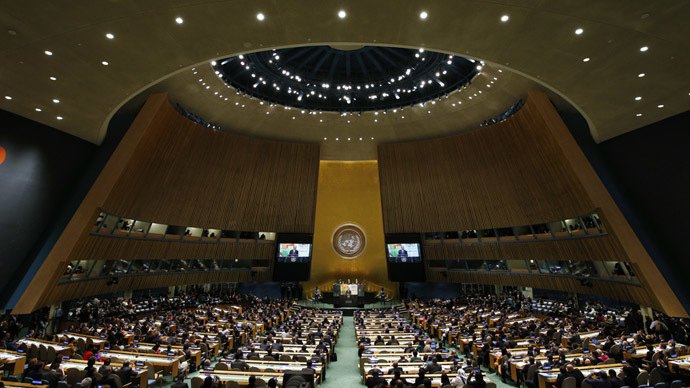Russian reflection on the role of the UN

The United Nations has been and remains the cornerstone of the international system. The goals, principles and rules sealed in the UN Charter are a vital source of international law and the basis of the code of conduct on the international stage.
They provide key elements for a polycentric world order by creating functional mechanism for governing the world by coordinating the positions of the leading states.
Unfortunately, for the last several years we have seen numerous violations of the UN fundamental principles, including the independence and sovereign equality of nations, non-interference in their internal affairs and peaceful settlement of disputes (e.g., bombing of Serbia, occupation of Iraq under a patently false pretext, gross manipulation of the UNSC mandate that resulted in destruction and chaos in Libya, inspiration of internal unrest and promotion of regime change, like in Ukraine last year). These are the consequences of attempts to claim domination in global affairs and unilateral use of military force in the pursuit of selfish interests.
Now we are reaching the point where we should give an answer to one question: Do we really want the UN, including its Security Council, to be an effective and influential instrument for maintaining international peace and security, or are we willing to allow it to become a platform for confrontation and exclude the Security Council from the search for vital international solutions?
I hope that we will choose the first option. For this to become true, we have to restore the UN Security Council’s role as the central agency for coordinating collective approaches based on respect for cultural and civilizational diversity in the world, and accept the fact that only trust and cooperation among members of the UN Security Council will help achieve necessary solutions to international crises. On this basis, the UNSC has addressed the key issues of the current crisis in Syria and Iraq, such as chemical disarmament in Syria, combating foreign terrorists, preventing terrorist groups from benefiting from trade in oil. Another recent example is the deployment of new peacekeeping missions in Mali and the Central African Republic. There are plans to directly address another painful issue in Africa – the terrorist threat coming from Boko Haram.
Russia has always promoted a positive and unifying agenda. We have always been and will be open to discussion of the most complex issues, no matter how unsolvable they might seem at the beginning. We will be prepared to search for compromises and the balancing of interests and go as far as to exchange concessions provided only that the discussion is based on mutual respect and equality. The policy of ultimatums and philosophy of supremacy and domination do not meet the requirements of the 21st century and run counter to the process of a polycentric and democratic world order taking shape.
The statements, views and opinions expressed in this column are solely those of the author and do not necessarily represent those of RT.
The statements, views and opinions expressed in this column are solely those of the author and do not necessarily represent those of RT.













